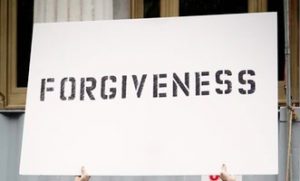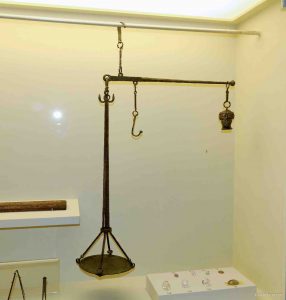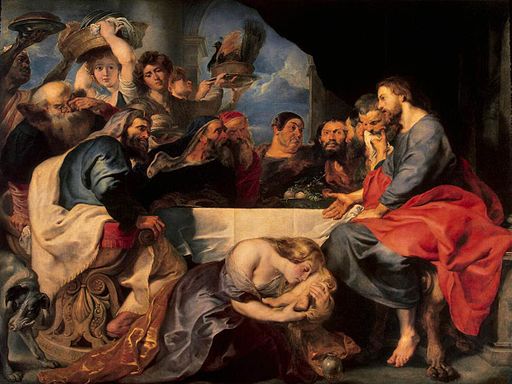by Lois Tverberg
“Forgive us our sins, for we also forgive everyone who sins against us.” Luke 11:4
 This petition of the Lord’s Prayer is a challenge to us — to ask for God’s forgiveness in the measure that we have forgiven those who have sinned against us. It is a difficult command from Jesus, but if we obey it, we can know that not only are we right with God, but we are free from the damaging effects of anger and feelings of vengeance toward others.
This petition of the Lord’s Prayer is a challenge to us — to ask for God’s forgiveness in the measure that we have forgiven those who have sinned against us. It is a difficult command from Jesus, but if we obey it, we can know that not only are we right with God, but we are free from the damaging effects of anger and feelings of vengeance toward others.
It is interesting to see the background of Jesus’ words about being forgiven as we forgive others. This command is most likely comes from the rabbinic understanding one of the two great commands – to love your neighbor as yourself.
We, of course understand that we should love others with the same measure that we love ourselves, which is certainly very true! But the rabbis also saw that the Hebrew of that verse can also be read as, “Love your neighbor who is like yourself.” While either interpretation is valid, their emphasis was not on comparing love of ourselves with love for others, but on comparing other people to ourselves, and then loving them because they are like us in our own frailties. The need to be forgiving arises naturally from realizing this fact. Even before Jesus’ time, it was expressed this way:
Forgive your neighbor’s injustice; then, when you pray, your own sins will be forgiven. Should a person nourish anger against another, and expect healing from the Lord? Should a person refuse mercy to a man like himself, yet seek pardon for his own sins? (28:2-4) (Ben Sira, c. 180 B.C.)
When we realize that we are just as guilty of sin as those we are angry with, we see that we shouldn’t bear grudges against them, but to forgive and love them instead. Jesus’ petition about forgiveness could almost have the words of the great commandment in it. We could say, “Please love us even though we are sinners, as we love other sinners like ourselves.”
Forgiving sins is one of the strongest tests of love – it is easy to love someone who has treated us rightly, but to love someone who has hurt us is far more difficult. God must love us greatly if he keeps forgiving our sins against him.
Photo by Felix Koutchinski on Unsplash

 The rabbis pointed out that this pattern of the punishment fitting the crime is a recurring theme throughout the Scriptures. Because Jacob deceived Isaac in his blindness into giving him the birthright, Jacob is fooled into marrying Leah when he is “blind” – when she is brought to him veiled, and in the night he doesn’t see his new wife. Or, because Pharaoh killed the Israelite boys by drowning them in the river, God defeated his army by drowning them too. Haman was hanged on the gallows that he prepared for Mordechai. The rabbis called this pattern “measure for measure” – midah keneged midah.
The rabbis pointed out that this pattern of the punishment fitting the crime is a recurring theme throughout the Scriptures. Because Jacob deceived Isaac in his blindness into giving him the birthright, Jacob is fooled into marrying Leah when he is “blind” – when she is brought to him veiled, and in the night he doesn’t see his new wife. Or, because Pharaoh killed the Israelite boys by drowning them in the river, God defeated his army by drowning them too. Haman was hanged on the gallows that he prepared for Mordechai. The rabbis called this pattern “measure for measure” – midah keneged midah. It is interesting to relate this idea to another one that Jesus used in his ministry – the Year of Jubilee. During the Year of Jubilee in Israel, all debts were to be forgiven, and any land that a family had been forced to sell in a time of famine could be reclaimed by them. It is interesting that the prophets and rabbis connected this thought of the year of Jubilee with the coming of the Messiah. In fact, one of Jesus’ first public statements about his ministry was to quote Isaiah 61, which says that he was anointed to proclaim “the year of the Lord’s favor,” meaning, the Jubilee year (Luke 4:19).
It is interesting to relate this idea to another one that Jesus used in his ministry – the Year of Jubilee. During the Year of Jubilee in Israel, all debts were to be forgiven, and any land that a family had been forced to sell in a time of famine could be reclaimed by them. It is interesting that the prophets and rabbis connected this thought of the year of Jubilee with the coming of the Messiah. In fact, one of Jesus’ first public statements about his ministry was to quote Isaiah 61, which says that he was anointed to proclaim “the year of the Lord’s favor,” meaning, the Jubilee year (Luke 4:19).